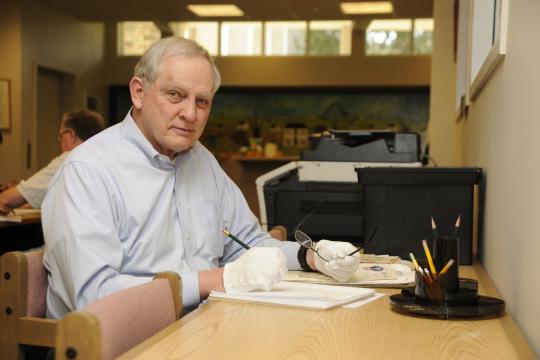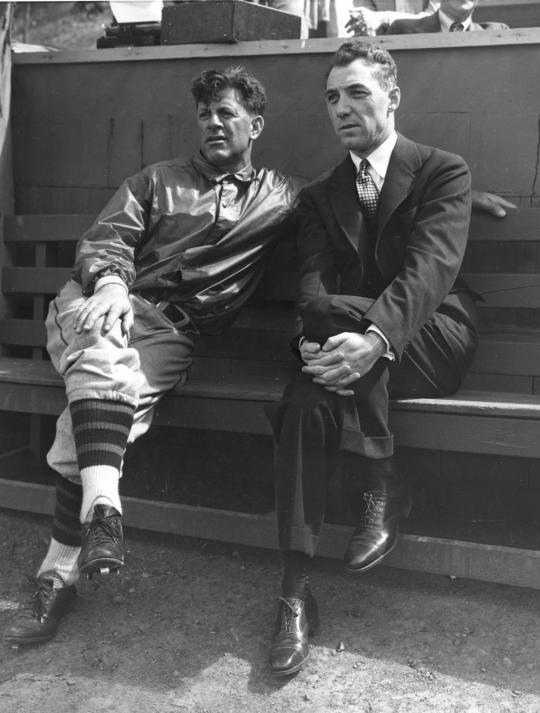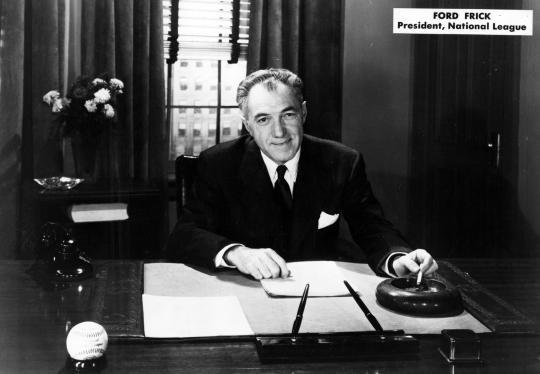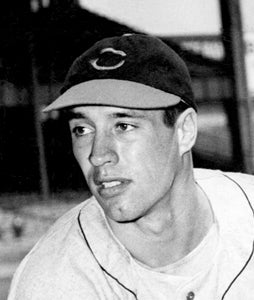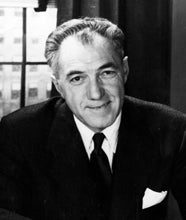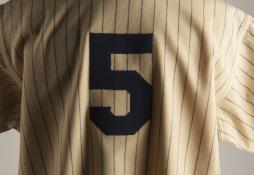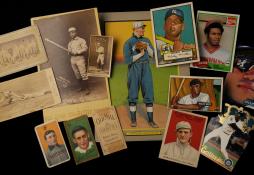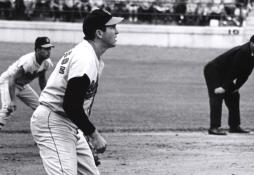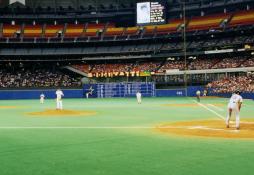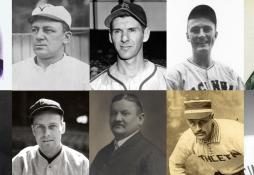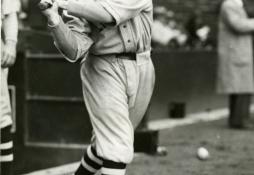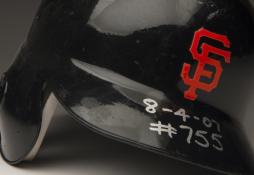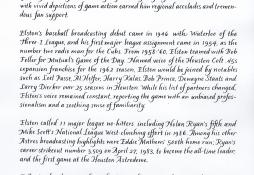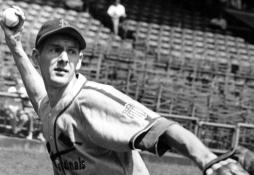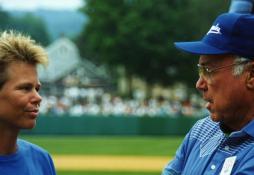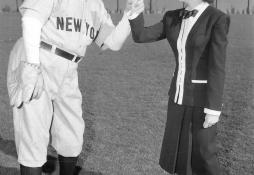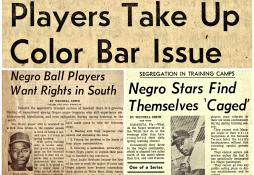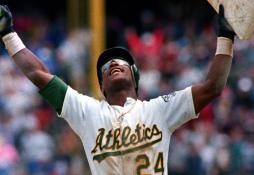Advance communication is critical. It’ll make your research go a whole lot quicker, and it takes full utilization of (the research staff’s) expertise in terms of how to find stuff.
- Home
- Our Stories
- Library research a hallmark of Museum’s mission
Library research a hallmark of Museum’s mission
For one 18-year-old freshman at DePauw University in the fall of 1965, the name baseball Commissioner Ford Frick – a DePauw alum – might not have meant much.
But in 2015, Dave Bohmer has Frick’s name on his mind quite a bit.
Bohmer, who retired in 2014 after 20 years of teaching at DePauw and worked in telecommunications before that, paid a two-week visit this month to the Giamatti Research Center at the National Baseball Hall of Fame Library. His purpose: To perform research on Frick for a biography he plans to write.
“I got interested, before I retired last May, in Ford Frick,” Bohmer said. “I realized there has never been (a book other than his memoirs) written about him. Yet his career as National League president, Commissioner, and along with what he did before then as a sportswriter, is pretty impressive. So I’ve decided to pursue a biography of him.”
For Bohmer, who grew up an Indians fan in Cleveland, paying attention to a baseball commissioner was nothing compared to keeping tabs on his heroes, Indians outfielder Rocky Colavito in particular.
“It’s funny. I heard somebody, in passing, mention that one of the trustees at DePauw was the commissioner of baseball,” Bohmer recalled. “But, you know, you’re 18 years old. If they told you (one of the trustees) was Rocky Colavito, who was your hero as a kid, you would have just said, ‘Oh, that’s cool!” and wanted to find out more about him. But the Commissioner of baseball? Who would have cared about that?”
As he pursues his research, which will involve multiple trips to Cooperstown as well as libraries and other institutions throughout the United States, Bohmer better understands why people should care about Frick’s contributions to baseball. After all, Frick, who graduated from DePauw 100 years ago, was President of the National League from 1934 to 1951 before becoming Commissioner and holding that office until 1965. It is the changes in baseball, which Frick helped influence during his career, that Bohmer wishes readers would take away from his book.
“I think the biggest thing I would argue – and will at the (Cooperstown Symposium on Baseball and American Culture) this summer – is Frick is viewed as sort of a do-nothing owners’ Commissioner and baseball just sort of passed by during that era,” Bohmer noted. “I think the game changed a lot, from expansion to franchise movement to the draft. In many ways, I think he’s a much more effective Commissioner than he’s given credit for.
“I would argue that (Bud Selig’s) been a very effective Commissioner. I would argue that, in both of their cases, it’s because they worked in baseball, in different capacities, for a long period of time, and they understood the realities of that position and how to effect change in that position.”
This is the second book idea that Bohmer has worked on, both of which have involved researching at the Giamatti Research Center. While researching his first idea in 2007, he had the opportunity to meet a Cleveland baseball legend.
“When I was here researching in the fall of 2007, I actually got to meet (Bob Feller),” said Bohmer, who fondly remembers the 1954 American League championship season, when the Indians won 111 games. “I don’t know who it was who walked up (to me) … and asked, ‘What are you working on?’ And before I could respond, he said, ‘Here, meet Bob Feller.’ Well, I’m a baseball fan and Bob Feller was an icon in Cleveland, so I’m speechless at that point in time.”
Though Hall of Famer sightings in the Giamatti Research Center do not often occur, many researchers discover interesting and unique tidbits while leafing through manuscript collections, books, and clippings files. After perusing Frick’s memoirs, published in 1973, and other information on Frick, Bohmer found that Frick neither played varsity baseball at DePauw nor grew up on a farm, as he had claimed.
“The resources at the Baseball Hall of Fame Library continue to astonish even longtime Hall of Fame employees,” noted Jim Gates, Librarian at the Hall of Fame for over 20 years. “Along with our researchers, we are constantly discovering new information from the materials in our archives. It just goes to show that there is always something new to learn.”
Bohmer, who learned of the Baseball Hall of Fame Library from a fraternity brother, reached out to Gates in 2007 to schedule a research appointment. Anyone wishing to make a visit for similar purposes is encouraged to contact the staff at the Giamatti Research Center as early as possible before their intended visit.
“We welcome everyone but suggest making an appointment in advance, especially for long-term research visits,” Gates said. “It helps give our staff enough time to identify and retrieve resources that can help your research.
“Another great resource is ABNER our online library catalog. You can perform a variety of searches to examine what is in our collection. If you can’t find what you’re looking for, our staff will be pleased to help.”
Contacting the Giamatti Research Center staff in advance is exactly what Bohmer recommends. Having had the opportunity to visit in the fall of 2014, Bohmer took the chance to discuss his needs and interests.
“(They) have been well-organized and prepared because of the communication we’ve had via email,” Bohmer said. “Advance communication is critical. It’ll make your research go a whole lot quicker, and it takes full utilization of (the research staff’s) expertise in terms of how to find stuff.”
For researchers planning an extended visit, it is also beneficial to become part of the membership program, as the cost of an individual membership is made up after just a couple of days. Bohmer has been a member since his first research trip in 2007.
Many of the thousands of patrons who visit the Giamatti Research Center yearly are there for research purposes, though they come from a number of backgrounds. Some are students while others enjoy baseball as a lifelong hobby. As in Bohmer’s case, some are academics who share their passion for baseball with their students. While the Director of the Pulliam Center for Contemporary Media and the Media Fellows Program at DePauw, Bohmer taught a very popular class called “Baseball as History.”
“A wide cross-section of individuals visit the Giamatti Research Center, and it is always intriguing to learn of their research topics,” Gates mentioned. “It is a mutually beneficial relationship. Researchers get the information they need, and we can reap the fruits of that research when a book or an article is published – items which can, in turn, help future researchers. “Sometimes the researchers will present their work at the Cooperstown Symposium, and it can lead to immediate feedback from other researchers with the same interests.” As for Bohmer, he insists there is still much exploration on Frick’s life and times left to be done before the book is written and published. But he hopes it will provide new glimpses and understanding of Frick, who was elected to the Baseball Hall of Fame in 1970 and was one of the prime supporters in establishing the Hall of Fame in the 1930s.
Matt Rothenberg previously managed the Giamatti Research Center at the National Baseball Hall of Fame and Museum

